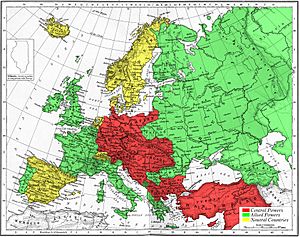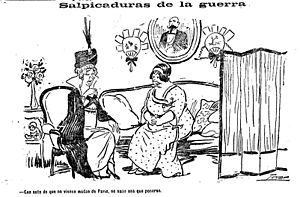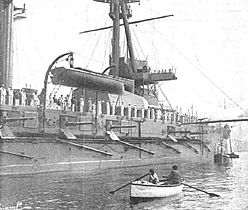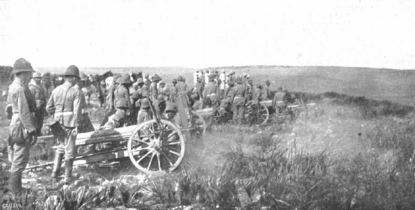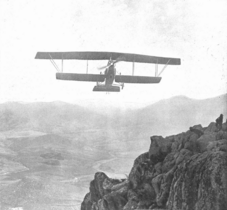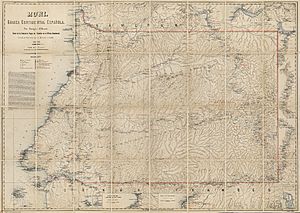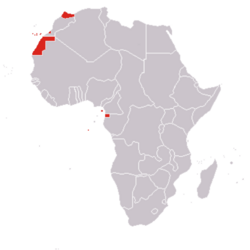Spain during World War I facts for kids
Spain stayed neutral during World War I, which lasted from July 28, 1914, to November 11, 1918. Even with some money problems at home, Spain was seen as one of Europe's most important neutral countries by 1915. Spain had already been neutral during the political troubles in Europe before the war. It kept this neutrality after the war until the Spanish Civil War started in 1936. While Spain did not fight directly in the war, some German soldiers were kept in Spanish Guinea in late 1915.
Contents
Why Spain Stayed Neutral
Spain's prime minister, Eduardo Dato, who was a Conservative, officially declared Spain neutral on August 7, 1914. He announced this in a special government newspaper called the Gaceta de Madrid.
"Since a state of war sadly exists between Austria, Hungary, and Serbia [...], the Government of His Majesty believes it must order all Spanish citizens to be strictly neutral."
Many people in the Spanish parliament, called the Cortes, praised Dato for this decision. However, people in Spain had different opinions about the war.
- Pro-Germany: Rich families, the Catholic Church, and the Spanish Army often supported the Central Powers, especially Germany. Some political groups, like the traditionalist Carlists and the conservative Mauristas, also favored Germany.
- Pro-Allies: Middle-class people, professionals, and thinkers usually supported the Allies, especially France. This view was common among Catalan nationalists, Republicans, and Socialists. Some Liberals and famous thinkers like Miguel de Unamuno also supported the Allies.
Italy's decision to stay neutral at first also helped Spain declare its own neutrality. Spain had an agreement with Britain and France from 1907. This agreement meant the Spanish navy would help the French navy if there was a war with the Triple Alliance (Germany, Austria-Hungary, and Italy). This was important because the British navy was busy in the North Sea, and the French navy needed help in the Mediterranean Sea.
Spain's Military Forces
During 1914-1918, the Spanish Army stayed on a peacetime footing. Unlike other neutral countries closer to the fighting, Spain did not call up many extra soldiers. Spanish troops even continued to wear colorful uniforms for parades, which quickly disappeared in armies fighting the war.
The main rifle used by the Spanish Army was a version of the Mauser, made in Oviedo. They also had a small number of machine guns like the Maxim and Hotchkiss. However, they had far fewer machine guns than other European countries. Their artillery used cannons made by Krupp or Schneider. Many of these weapons were being used in the Rif War in northern Morocco, where Spain had a protectorate.
The Spanish Navy was not very strong, but it was starting to rebuild. Its best ships were the dreadnought battleship España and the older battleship Pelayo. Two more dreadnoughts, the Alfonso XIII and Jaime I, were being built. The navy also had several cruisers, destroyers, and torpedo boats. Many of Spain's ships were older ones that had survived the Spanish–American War. Other ships were newer, built under a plan called the Ferrándiz Plan.
The Military Aeronautics, which later became the Spanish Air Force, was very new, created in 1913. It had only a few planes, all of which were bombers. Fighter planes did not appear until later in the war. Spain's neutrality meant it missed out on new airplane technologies developed during the war. By the end of the war in 1918, Spain's air force was much weaker than those of its neighbors.
- Some pictures of Spanish Armed Forces of that time
-
The battleship España in the port of Bilbao during a Royal visit in 1915.
-
A Lohner B.I airplane of the Spanish Army returning to its base in the Tetuan area in 1913.
How the War Affected Spain
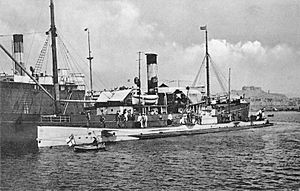
Even though Spain was neutral, the war still affected it in many ways.
Spain's economy saw both good and bad effects. German submarines attacked Spanish merchant ships, causing about 100 deaths and sinking 66 ships. However, industries in northern and eastern Spain grew because the warring countries needed Spanish goods. This brought money into Spain but also caused prices to rise. Imports dropped, making poverty worse in rural areas and the south. More people moved to industrial areas, and the railway system struggled to handle the extra demand. Spain also faced a shortage of food, known as the crisis de subsistencias. In 1915, there were food riots in some cities, and the government resigned.
In July 1916, two major worker unions, the socialist Unión General de Trabajadores and the anarchist Confederación Nacional del Trabajo, teamed up. They wanted to pressure the government and even threatened a general strike in March 1917. This inspired military officers to form their own groups called juntas de defensa. These officers wanted to stop a new law that would make it harder to get promotions in the military. They wanted promotions to be based only on how long someone had served.
The war also greatly affected the building of new ships for the Spanish Navy. The second and third España battleships were delayed because it was hard to get materials from Britain. The main guns for the battleship Jaime I did not arrive until 1919, after the war ended. Plans for other new battleships were completely canceled after the war began.
The war also had a big social impact. Even though Spain was neutral, the conflict divided the country into 'Francophiles' (who liked France and the Allies) and 'Germanophiles' (who liked Germany and the Central Powers). This division grew deeper because German submarines kept sinking Spanish ships. The army, church, and conservatives often supported Germany. Merchants, liberals, and most of the public leaned towards the Allied side.
About 10,000 Spanish workers returned home from Belgium, France, and Germany during the war. They told people about the harsh realities of the fighting. Spanish journalists also reported from near the battlefronts, keeping the public informed. Their different viewpoints also added to the divided feelings in the country.
Some Spaniards volunteered to join the French Army as early as August 1914, mostly joining the French Foreign Legion. In 1915, they started their own magazine, Iberia, to promote their cause. More than 2,000 Spaniards ended up serving in the Legion. King Alfonso XIII also tried to help by creating the European War Office, which helped prisoners of war and civilians.
The Fernando Po Affair
In 1916, an event called the Fernando Po Affair almost ended Spain's neutrality. British, French, and Belgian forces had taken over German Cameroon. This forced about 6,000 German colonial troops, called Schutztruppe, to retreat into nearby Spanish Guinea. These well-trained troops were formally kept on the Spanish colonial island of Fernando Po. However, they continued to train under German officers.
The Allies worried that these troops were a threat to their own African lands. They threatened to invade the Spanish colony. The Spanish government managed to solve the problem by moving the German officers to Spain itself. The African Schutztruppe stayed on Fernando Po until the war ended in November 1918.
See also
 In Spanish: España en la Primera Guerra Mundial para niños
In Spanish: España en la Primera Guerra Mundial para niños
- Spanish flu
- Diplomatic history of World War I
- International relations (1814–1919)
- Spain during World War II
 | Claudette Colvin |
 | Myrlie Evers-Williams |
 | Alberta Odell Jones |


